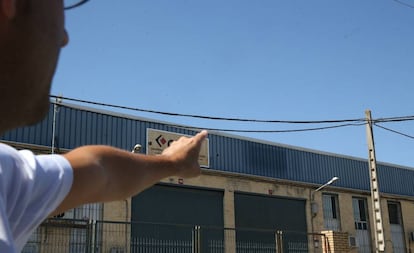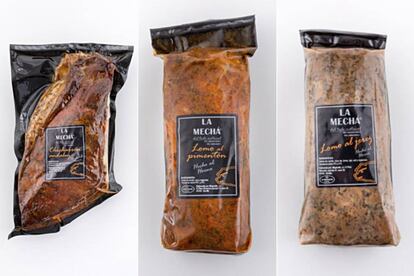Spain issues international health alert over listeriosis outbreak in Seville
One woman has died so far from the bacterial infection, with 150 more confirmed cases and 529 pending confirmation. The source was meat from a firm in the southern province

An outbreak of listeriosis in Spain caused by meat produced by a firm in the southern Spanish province of Seville is now having international repercussions. The country’s Health Ministry has activated alert and communication systems with the European authorities and the World Health Organization (WHO) “given the possibility that cases might be detected in other countries.” The move, according to ministerial sources, is a precaution in case any tourists visiting the country may have contracted the infection after consuming contaminated pork products in Spain. So far there have been no registered cases outside of the country.
The current outbreak of the bacterial infection has its source in a pork loin product, known in Spanish as ‘carne mechada’
The current outbreak of the bacterial infection has its source in a pork product known in Spanish as carne mechada, sold under the brand name La Mechá, and produced by the Seville-based company Magrudis S.L.. Carne mechada is made with pork loin cooked in its own fat. The lard is inserted into the meat using an instrument called a larding needle, or mechadora in Spanish. The finished product is usually served cold, in slices.
On Wednesday, the health chief in Andalusia, Jesús Aguirre, confirmed that there are 132 cases in the southern Spanish region, as well as four more in neighboring Extremadura, and three in each of the following regions: Catalonia, Asturias and Aragón. The total number of infections currently stands at 145, with the number of suspected cases – i.e. people with symptoms compatible with listeriosis but who are yet to be positively diagnosed – as high as 529.

A total of 53 people – including 23 pregnant women – are currently hospitalized in Andalusia due to the bacterial infection, three of whom are in intensive care. So far, one person has died from the outbreak: a 90-year-old woman who passed away in the early hours of Monday in a Seville hospital. In other regions, the most important case involves a “premature newborn whose mother consumed carne mechada in a bar in Madrid in July,” the Health Ministry announced on Wednesday.
Listeriosis is a bacterial infection that can cause severe illnesses such as sepsis, meningitis and encephalitis, and can even be fatal. Those most at risk are the elderly, unborn babies and newborns, or people whose immune systems are compromised. The infection can also cause gastroenteritis and fever. It is primarily transmitted, as in this current outbreak in Spain, by the ingestion of contaminated foods.
Listeriosis is a bacterial infection that can cause severe illnesses such as sepsis, meningitis and encephalitis, and can even be fatal
The severity of the crisis has prompted the Andalusian regional premier, Juan Manuel Moreno, to cut short his summer vacation in order to preside over a government committee that will be monitoring the outbreak.
On August 14, Seville City Council, run by the Socialist Party (PSOE), took the “precautionary” measure of halting production at the Magrudis factory. From that same day onward, the Andalusian regional government – which is in the hands of the conservative Popular Party (PP) and center-right Ciudadanos, with the support of far-right Vox – limited itself to ordering the pork loin products off the shelves but allowed for the continued sale of other products from the company. Supermarkets such as Alcampo, meanwhile, withdrew all of the firm’s products from its shelves.
The regional government waited five days before taking the product off the market
The regional government waited until Wednesday of this week before ordering all products from Magrudis to be taken off the market. These include lomos, a kind of preserved pork loin, and chicharrones, or pork belly. Experts such as José Juan Rodríguez, a professor in nutrition and bromatology at the Autonomous University of Barcelona, have expressed surprise at the decisions taken by the regional government. “With the existing evidence that points to the contamination of the pork loin having taken place in the factory, it would have been recommendable to withdraw all of the [company’s] products,” he said.
The regional government also waited five days before taking the product off the market, despite being aware on August 9 that two samples analyzed had returned a “highly positive” result. The Junta, as the regional government is known, admitted on Wednesday to a “two or three” day delay, but regional official Elías Bendodo blamed this on Seville City Hall, accusing the municipal laboratory that carries out such analyses for the Junta of having mixed up the meat samples, something that the local authority denies. City Hall has defended its management of the crisis and has insisted that the samples of meat from different companies that it received were incorrectly labeled.
The acting health minister, María Luisa Carcedo, waded into the controversy after stating that some procedures must have failed for the outbreak to become the biggest ever seen in Spain. “There will now have to be inspections and probes, which will have to be carried out by the civil servants in the Andalusian Junta, because this is a regional competence,” she said. “And we will find out where the failure was. But obviously [a failure] has taken place because the established procedures are designed so that this does not happen.”
English version by Simon Hunter.
Tu suscripción se está usando en otro dispositivo
¿Quieres añadir otro usuario a tu suscripción?
Si continúas leyendo en este dispositivo, no se podrá leer en el otro.
FlechaTu suscripción se está usando en otro dispositivo y solo puedes acceder a EL PAÍS desde un dispositivo a la vez.
Si quieres compartir tu cuenta, cambia tu suscripción a la modalidad Premium, así podrás añadir otro usuario. Cada uno accederá con su propia cuenta de email, lo que os permitirá personalizar vuestra experiencia en EL PAÍS.
¿Tienes una suscripción de empresa? Accede aquí para contratar más cuentas.
En el caso de no saber quién está usando tu cuenta, te recomendamos cambiar tu contraseña aquí.
Si decides continuar compartiendo tu cuenta, este mensaje se mostrará en tu dispositivo y en el de la otra persona que está usando tu cuenta de forma indefinida, afectando a tu experiencia de lectura. Puedes consultar aquí los términos y condiciones de la suscripción digital.








































